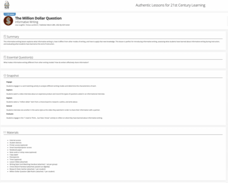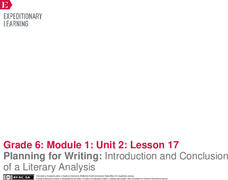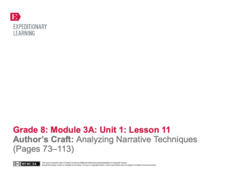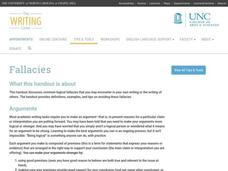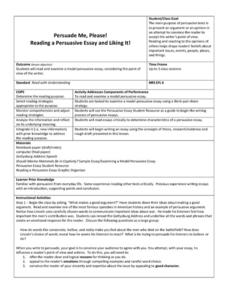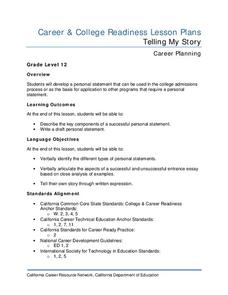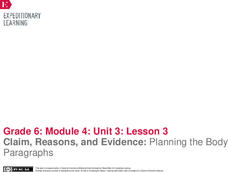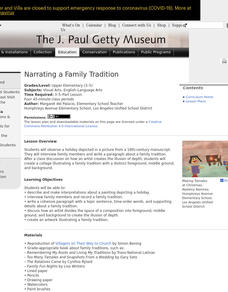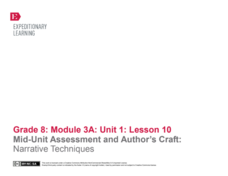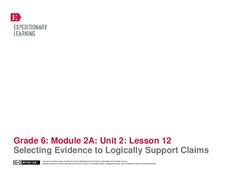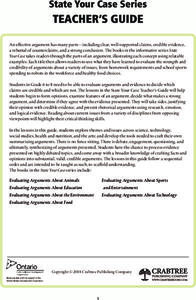K20 LEARN
The Million Dollar Question: Informative Writing
Introduce high school freshmen to the characteristics of informative writing with a 5-day lesson that distinguishes informative writing from other modes. Scholars learn how to search for and cite reliable resources, then research and...
K20 LEARN
Introduction to Expository Writing
Move beyond the five-paragraph essay with a lesson introducing young writers to various forms of expository writing. Class members examine description, cause and effect, problem solution, sequence, and comparison forms. They create an...
EngageNY
Planning for Writing: Introduction and Conclusion of a Literary Analysis
It's all about the introduction. Scholars work on the introductory paragraph for their essays, connecting the theme of a myth and The Lightning Thief. They use a graphic organizer to help focus their work and then move to working on the...
Encyclopedia Britannica
Write an Election Day Letter
For some, getting to the polls to vote is no easy task. Voting may mean needing to choose between a job and civic duty. But what if Election Day was a national holiday? After reading an article about the pros and cons of designating...
Ford's Theatre
How Perspective Shapes Understanding of History
The Boston Massacre may be an iconic event in American history, but perhaps the British soldiers had another point of view. Using primary sources, including reports from Boston newspapers and secondary sources from the British...
K20 LEARN
Speak Your Truth: Techniques in Spoken Word Poetry
As part of a study of Spoken Word Poetry, class members watch a series of performance videos and note where poets get their ideas and the performance techniques used by the poets. Pupils then draft and share their poems.
Scholastic
Choose Your Words Wisely (Grades 9-12)
Words, words, words. The function of words in persuasive writing is the focus of a group activity that asks members to analyze how words advertisers use are designed to influence targeted audiences.
EngageNY
Author’s Craft: Analyzing Narrative Techniques (Pages 73–113)
Scholars discuss a reading selection in Unbroken by writing to a partner about text selection. After completing the writing, learners revisit the use of active and passive sentences by reviewing a second Active and Passive Sentences...
EngageNY
Final Performance Task: Critique and Revision, Part I
Let's work together! Scholars engage in the peer editing protocol, giving and receiving feedback on their draft opinion speeches. They then use classmates' feedback to begin working on their revisions.
EngageNY
Writing and Evaluating Expressions—Exponents
Bring your young mathematicians into the fold. Scholars conduct an activity folding paper to see the relationship between the number of folds and the number of resulting layers in the 23rd installment of a 36-part module. The results of...
University of North Carolina
Fallacies
All teacher workrooms contain a coffee maker, therefore all teachers must be addicted to coffee. That sentence represents a logical fallacy (although it may be true from some), a topic the seventh installment in the 24-part Writing the...
Curated OER
The Writer’s Toolbox: What You Need to Master the Craft
All the tools (and directions) you’ll need to build an essay are included in a resource designed for learners and educators. The packet can be given to class members or divided into sections and used as part of a series of lesson on the...
EngageNY
Presenting a Research-Based Claim: Effective Speaking Techniques
Take note. Scholars receive their claim drafts back to revise and write their claims and three pieces of evidence on notecards. They save the notecards to use when the verbally present their claims to the class. At the end, individuals...
Curated OER
Persuade Me, Please! Reading a Persuasive Essay and Liking It!
Persuade your writers that crafting arguments is not that difficult. They only need to follow the steps outlined in this resource.
Channel Islands Film
Arlington Springs Man: Lesson Plan 1
Learning to craft quality questions is a skill that can be taught. Class members use the Question Formulation Technique to learn how to create and refine both closed-ended and open-ended questions. They then view West of the West's...
Scholastic
My Favorite Activity (Grades K-2)
Scholars discuss the many ways they use persuasion in their everyday lives and brainstorm specific ideas for encouraging someone to do something. With the list of persuasive techniques they made, young writers complete a graphic...
California Department of Education
Telling My Story
Entrance essays are the ultimate sales pitch! Show your seniors how to market themselves in the first of six college and career readiness lesson plans. Pupils discover the do's and don'ts of writing personal statements through research,...
EngageNY
Claim, Reasons, and Evidence: Planning the Body Paragraphs
Planning is the key to success. Scholars continue planning their essays by adding reasons to their Planning My Argument graphic organizers. Additionally, pupils analyze a body paragraph from a model position paper, identifying the...
J. Paul Getty Trust
Narrating a Family Tradition
After examining a piece of art, scholars discuss what they see, paying close attention to details and space. A read-aloud introduces the topic of family traditions. Pupils interview their family members about a tradition in preparation...
EngageNY
Mid-Unit Assessment and Author’s Craft: Narrative Techniques
Scholars work together to compile a list of things good writers do to perfect their craft and write the ideas on a whiteboard. They then discuss the differences between passive and active sentences and use their knowledge to identify...
K20 LEARN
Ethos, Logos, Pathos: Persuading Your Audience
Ethics, emotion, reason—scholars investigate advertisers' persuasive techniques to attract buyers. After examining the techniques used in infomercials, writers craft a persuasive essay on a topic of their choice.
EngageNY
Selecting Evidence to Logically Support Claims
It's time to make a rule sandwich! After exploring the writing assignment's rubric and analyzing a model essay, learners are guided through the prewriting phase using the sandwich technique. Pupils create their sandwich addressing the...
Crabtree Publishing
State Your Case Series
Four lessons make up a unit focused on writing persuasive essays. Each unit builds on the last, ultimately taking pupils through the writing process. Scholars make a claim, create an argument, debate both sides, then state their opinion....
EngageNY
End of Unit Assessment, Part 2: Drafting Introduction and Conclusion of a Narrative
First and last impressions matter. Scholars compose the introductory and concluding sections of their narrative writing assignments. Also, to prepare for an upcoming performance task, pupils watch a modern-day monologue from the movie...
Other popular searches
- Writing Technique Persuasive
- Timed Writing Technique
- Review Writing Technique
- Analyze Writing Technique
- Writing Technique Gt
- Evaluate Writing Technique
- Nonfiction Writing Technique
- Writing Technique Clerical
- Writing Technique Rubric
- Writing Technique Writing Type
- Writing Technique Closing
- Writing Technique + Closing


